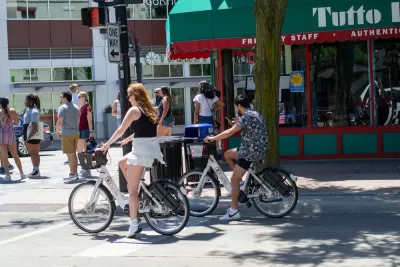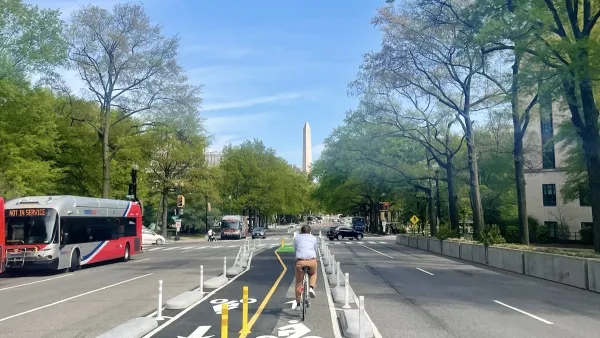The new document consolidates the city’s Complete Streets projects with its sustainability plan, providing a flexible framework for comprehensive actions that focus on safety, sustainability, and equity.

Madison, Wisconsin is adopting a “Complete Green Streets” policy aimed at consolidating the city’s efforts to build safe, accessible, and pleasant streets for all with its sustainability goals. Writing in Smart Cities Dive, Maria Rachal explains that the policy is designed to be a “flexible tool that can evolve” with the city’s needs.
According to the new city-issued guide, “With significant growth and development, rising concerns about safety, and increased awareness of disparities, Madison needed a more detailed approach to designing streets that reflects our community’s values and priorities.”
The new policy combines Complete Streets and focuses on four values: prioritizing the safety and comfort of people; supporting community engagement and emphasizing short neighborhood trips; fostering more sustainable transportation and land use; and centering equity, which the city defines as “engaging inclusively, providing access to opportunities, prioritizing and supporting the needs of historically underserved people.”
FULL STORY: Madison, Wisconsin, approves complete green streets policy

Planetizen Federal Action Tracker
A weekly monitor of how Trump’s orders and actions are impacting planners and planning in America.

Chicago’s Ghost Rails
Just beneath the surface of the modern city lie the remnants of its expansive early 20th-century streetcar system.

San Antonio and Austin are Fusing Into one Massive Megaregion
The region spanning the two central Texas cities is growing fast, posing challenges for local infrastructure and water supplies.

Since Zion's Shuttles Went Electric “The Smog is Gone”
Visitors to Zion National Park can enjoy the canyon via the nation’s first fully electric park shuttle system.

Trump Distributing DOT Safety Funds at 1/10 Rate of Biden
Funds for Safe Streets and other transportation safety and equity programs are being held up by administrative reviews and conflicts with the Trump administration’s priorities.

German Cities Subsidize Taxis for Women Amid Wave of Violence
Free or low-cost taxi rides can help women navigate cities more safely, but critics say the programs don't address the root causes of violence against women.
Urban Design for Planners 1: Software Tools
This six-course series explores essential urban design concepts using open source software and equips planners with the tools they need to participate fully in the urban design process.
Planning for Universal Design
Learn the tools for implementing Universal Design in planning regulations.
planning NEXT
Appalachian Highlands Housing Partners
Mpact (founded as Rail~Volution)
City of Camden Redevelopment Agency
City of Astoria
City of Portland
City of Laramie





























